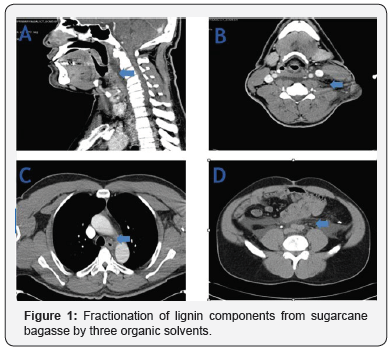Retropharyngeal, Mediastinal, Retroperitoneal Edema: A Rare Presentation of Angiotensin Converting Enzyme Inhibitor (ACEI) Induced Angioedema
Muhammad Umer Butt MDMS1, Ahmad Jabri MD2* and Samy Claude Elayi MD3
1Department of Cardiology, Metrohealth Medical Center, USA
2Department of Internal Medicine, Akron General Cleveland Clinic, USA
Submission: April 30, 2019; Published: June 07, 2019
*Corresponding author: Ahmad Jabri Md, Department of Internal Medicine; Akron General Cleveland Clinic; Akron Ohio, Angiotensin Converting Enzyme (ACE), Ohio, USA
How to cite this article: Md Umer B M, Ahmad Jabri M, Samy Claude E M. Retropharyngeal, Mediastinal, Retroperitoneal Edema: A Rare Presentation of Angiotensin Converting Enzyme Inhibitor (ACEI) Induced Angioedema. JOJ Int Med. 2019; 1(1): 555553.
Abstract
Angioedema is a scarce and potentially life-threatening complication of angiotensin converting enzyme (ACE) inhibitor use. ACE inhibitors previously were noted to cause oropharyngeal and airway edema. Visceral edema involving the gastrointestinal tract was previously seen occasionally. We present here a rare case of retropharyngeal, prevertebral, retroperitoneal edema related to ACE inhibitor use that has not been documented before. The patient presented with throat soreness with changes in his voice. Computed tomography showed edema within the hypopharynx, prevertebral soft tissue extending to the upper mediastinum, and even down to retroperitoneum. The laboratory work was within normal limits, ruling out acquired, hereditary or allergic/immunologic type of angioedema. All clinical symptoms resolved immediately with lisinopril discontinuation without any other therapy.
Keywords: ACEI Retropharyngeal Mediastinal Retroperitoneal edema Enzyme inhibitor Retroperitoneum lisinopril
Introduction
Angioedema is a rare but potentially life-threatening complication of angiotensin converting enzyme (ACE) inhibitor use. Most presentations involve edema of the tongue or oral pharynx or airways occasionally visceral form involving the gastrointestinal tract [1,2]. We present here a rare case of retropharyngeal, prevertebral, retroperitoneal edema related to ACE inhibitor use that has not been documented before.
Case Report
52-year-old African American male presented to ER with the chief complaint of swelling on the left side of the neck worsening over the last few hours along with abdominal discomfort and back pain. Patient also had some soreness in the throat with changes in his voice. Patient had been on lisinopril for his hypertension for about 2 years. Vitals and systemic examination were within normal limits. CT scan of showed severe edema within the hypopharynx, prevertebral soft tissue extending to the upper mediastinum, and even down to retroperitoneum (Figures A-D). Quantitative C1-I Functional C1-INH C4 Level, C1q Level C3 Level were all within normal limits, ruling out acquired, hereditary or allergic/immunologic type of angioedema. All clinical symptomsresolved immediately with lisinopril discontinuation without any other therapy. A repeated CT scan within 2 days showed resolution of edema.

Discussion
Angioedema of the tongue and lips with no urticarial and pruritus is the classic presentation of ACEI-induced angioedema. A large number of patients are treated with this class of medication thus ACE -Inhibitor became the most common cause of angioedema in patients who presented to the hospital. A physician should hold high suspicion of ACE inhibitors induced angioedema in any patient how has rapidly developing edema either visceral or non-visceral, irrespective of duration of therapy.
Conflict of Interest
No conflict of interest to declare
References
- Byrd JB, Adam A, Brown NJ (2006) Angiotensin-converting enzyme inhibitor- associated angioedema. Immunol Allergy Clin North Am 26(4): 725-727.
- Israili ZH, Hall WD (1992) Cough and angioneurotic edema associated with angiotensin-converting enzyme inhibitor therapy: a review of the literature and pathophysiology. Ann Intern Med 117(3): 234-242






























